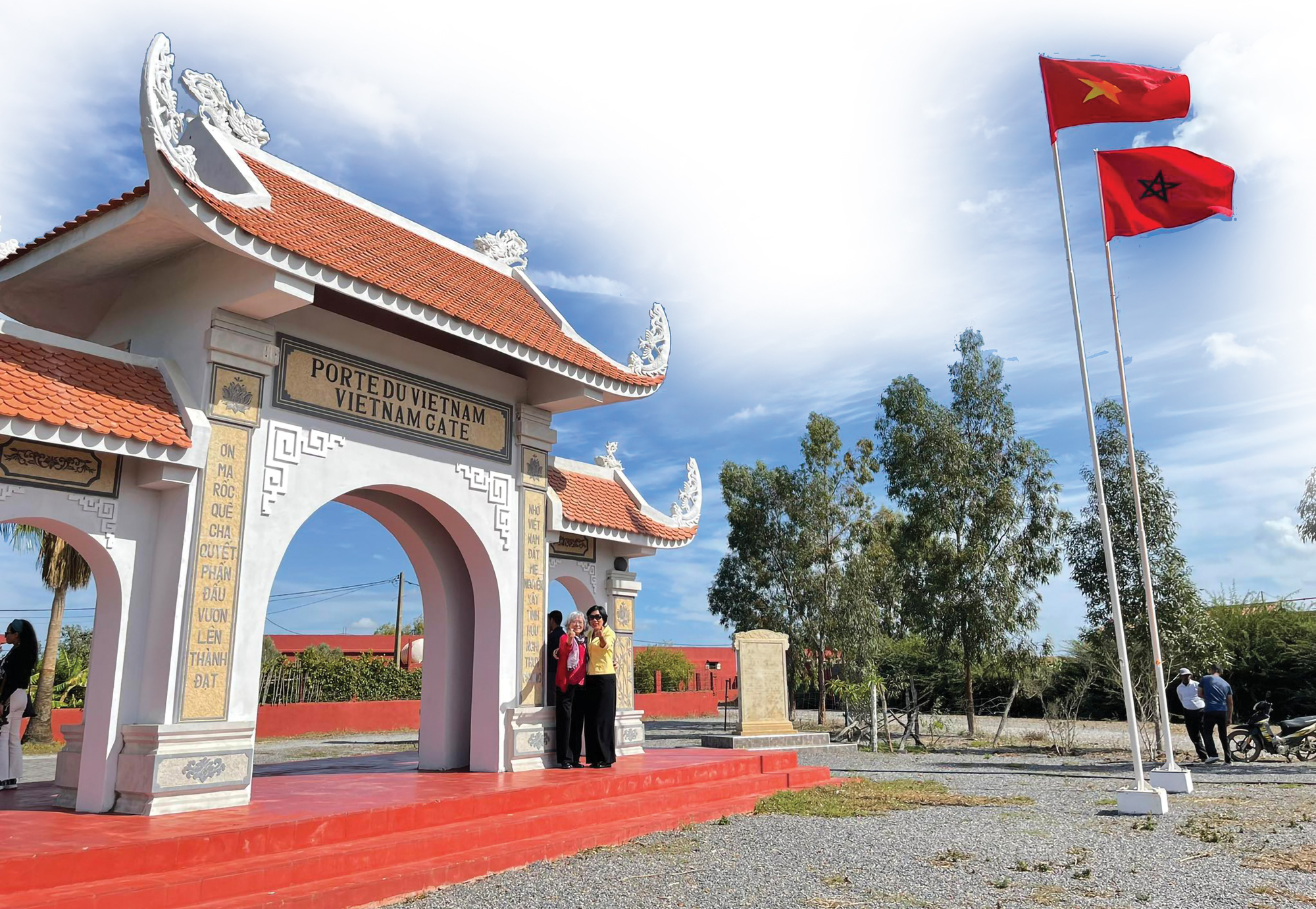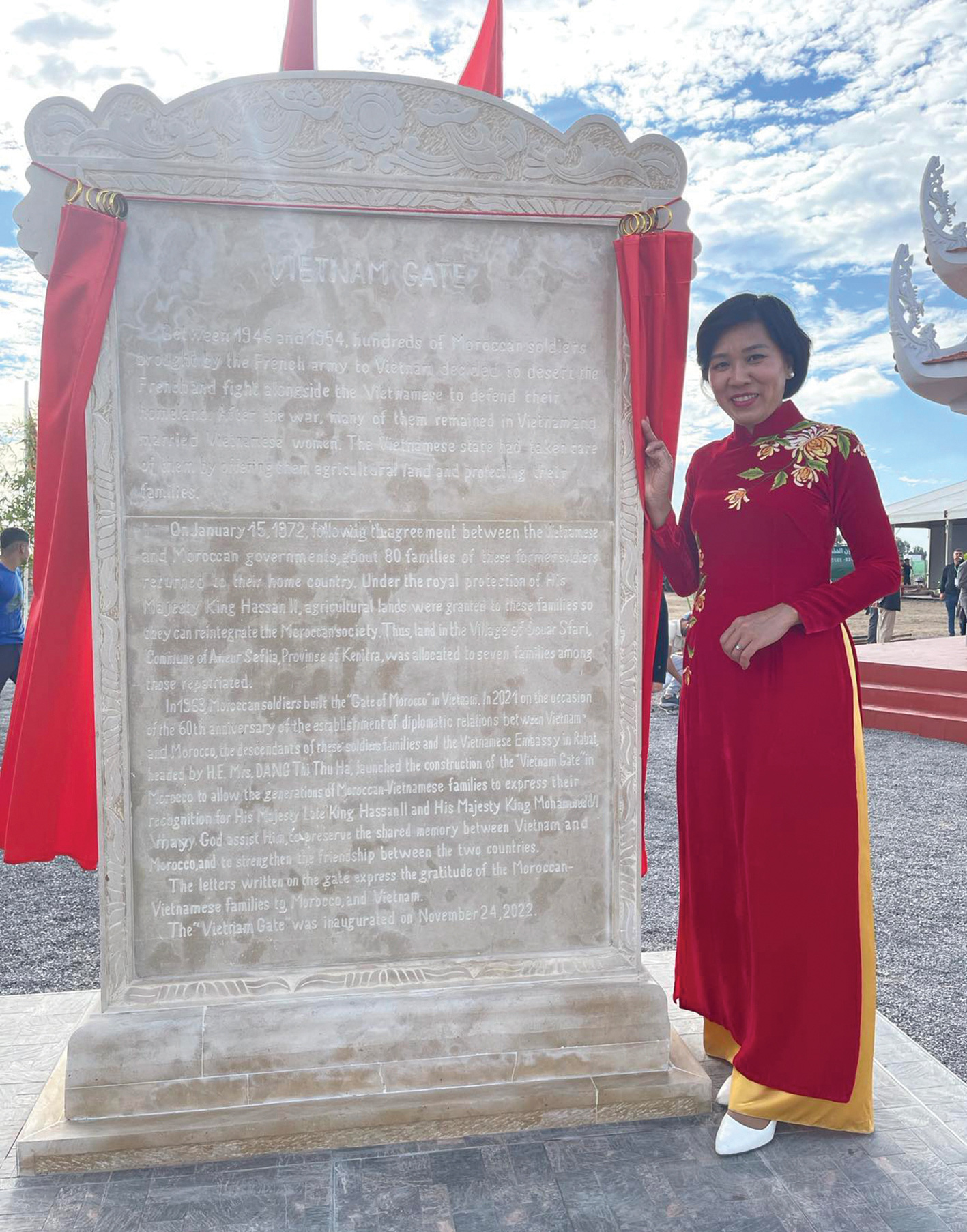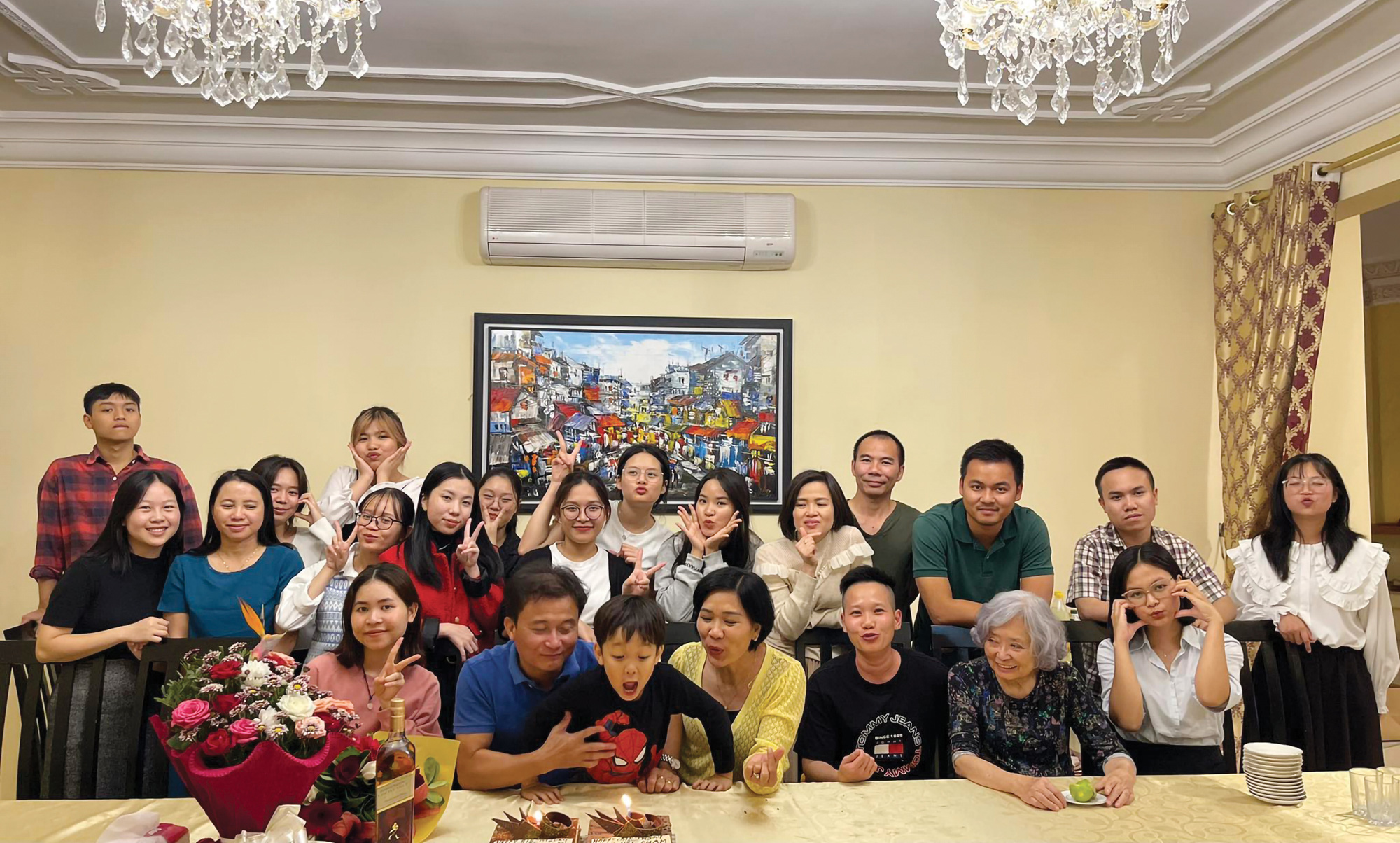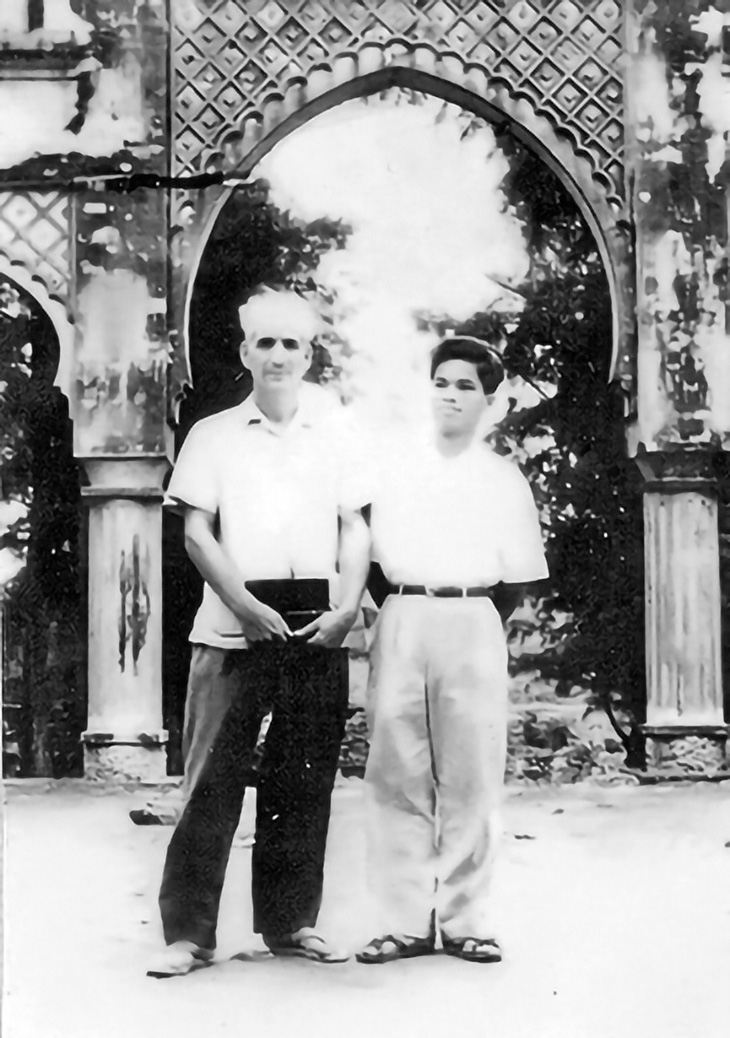Editor’s note: War correspondent and activist Tran To Nga, an 82-year-old Vietnamese-French living in Paris, shared with Tuoi Tre (Youth) newspaper her unexpected journey to Morocco, where she connected with the Vietnamese community.
I traveled to Morocco at the invitation of the charming ambassador Dang Thi Thu Ha, just before her four-year term concluded.
While unplanned, those four days in Morocco proved to be incredibly enriching, offering me a unique opportunity to discover Vietnam again in the heart of North Africa.
The gate takes shape
For the first time, I stepped inside an embassy and indulged in a meal of homemade pork intestines prepared by the embassy officials themselves.
There, I listened intently as the ambassador passionately talked about the village gate that was built through a collaborative effort between herself, the Vietnamese community in Morocco, and the Moroccan people, who provided unwavering emotional, material, and technical support.
A Vietnam village gate in a foreign country! A Vietnam village gate nestled within the confines of a Muslim country like Morocco.
Such a sight is rare, even in Vietnam, amidst its gradual modernization and urbanization, where village gates are becoming increasingly scarce.
In Douar Sfari, a suburb of Kenitra City, stands a Vietnam village gate adorned with two red flags -- one bearing a yellow star, the other a green star -- fluttering in the wind.
Flanking the gate are two parallel sentences conveying a pledge to honor Vietnam and Morocco, aiming to strengthen bonds and achieve success in both countries.
To construct the village gate, the ambassador underwent approval procedures from her homeland and the Moroccan authorities, with direct involvement from grassroots to municipal levels. Materials such as tiles and ridge beasts came all the way from Vietnam.
The gate is situated where the first seven Vietnamese families settled in Morocco 50 years ago. Back then, there was no electricity, and the village’s dirt road became impassable for cars when it rained.
The ambassador and officials commuted 100 kilometers weekly to oversee the project.
On the inauguration day (November 24, 2022), the ambassador joyfully welcomed over 600 guests from various locations to witness the ceremony.
I had the privilege of traveling in a diplomatic car to visit the village gate, where well-maintained roads and year-round electricity contrasted with memories of the past.
As emotions welled up within me, I observed the red flag with a yellow star flying in tandem with the red Moroccan flag adorned with a green star.
|
|
| Vietnamese Ambassador to Morocco Dang Thi Thu Ha poses next to the stele explaining the story of the Vietnam gate in Morocco. Photo: Supplied |
Honoring our homeland’s traditions, the ambassador and her officials made offerings to express gratitude to the heavens and earth for their completion of the assigned tasks with pride over the past four years.
As they bid farewell to this Muslim country, they may depart with a sense of security, acknowledging that their presence has left a lasting impression on both the Vietnamese and Moroccan communities.
Within the Vietnamese community in Morocco, the daughter of Nhung, who accompanied her husband to the African country half a century ago, erected a miniature Vietnam gate at the entrance of her home to bring joy to her mother. She also encouraged fellow families to do the same.
This initiative contributes to the development of a more defined Vietnamese village in Morocco, reflecting a collective commitment to preserving cultural roots.
Vietnamese women in Morocco
The Vietnamese community in Morocco has roots dating back to 1972.
Reflecting on history, during Vietnam’s resistance war against France, many French soldiers and those from the French Foreign Legion, a branch of the French Army, surrendered to the army of Vietnam and later engaged in local peacekeeping efforts, earning them the moniker 'peace soldiers.'
While primarily involved in military tasks, some sought to lead ordinary lives like any other citizen in Vietnam. Many married Vietnamese women and started families.
In 1972, the king of Morocco granted them permission to return home. When they came back to their homeland, they brought their wives and children with them.
In Al-Shinwa, another village in Kenitra, seven original Vietnamese families were allocated land by the king for livelihoods.
Subsequent families dispersed to other cities such as Casablanca or places further afield like Marrakech.
The Vietnamese wives brought to Morocco the vitality, courage, and industrious spirit of their homeland, cultivating gardens and establishing villages to sustain their families, while also imparting Vietnamese customs and traditions to their descendants.
Despite subsequent generations predominantly speaking Arabic and French, many still retain a basic understanding of Vietnamese.
Although most follow their paternal ancestors’ Islamic faith, they maintain a strong connection to their maternal Vietnamese roots.
During my encounters, I met elderly women aged nearly or over 80, as well as their children and grandchildren aged 20 to 40, all of whom greeted me in Vietnamese before adhering to the European tradition of exchanging three kisses.
Upon meeting Minh, a 90-year-old woman, she immediately asked me, “Can you still speak Vietnamese?”
Her question ignited an instant connection between us, and my fondness for her blossomed from that moment.
Minh then recounted her experiences of over 50 years working in a foreign land.
With five children to care for, the inability to speak Arabic or any foreign language, and a husband preferring to live off the king’s allowance, Minh had to seek help and guidance from female acquaintances, who came to Casablanca just a little while before her.
Fortunately, connections forged in Vietnam facilitated support networks that endured through the years.
Minh took on any available job, in France and wherever opportunities arose, to provide for her children.
Her guiding principle, she emphasized, was to maintain dignity and pride regardless of the challenges faced.
At 90 years old, Minh takes pride in her life’s accomplishments: raising her six children to adulthood, restoring her ancestors’ graves in Vietnam, and providing support to her relatives.
Regardless of her age, her mind remains sharp as she cares for herself using natural remedies, such as leafy plants, and maintains her appearance with homemade rice and honey facial cream.
Despite her husband’s remarriage and eventual illness decades later, Minh graciously took him in, tended to his needs, and handled his funeral arrangements entirely.
She even prepared a whole cow for guests who came to offer condolences during his funeral.
The Vietnamese woman left her neighbors surprised and admiring over her unwavering compassion and resilience -- attributes emblematic of the Vietnamese spirit.
|
|
| Overseas Vietnamese students visit the Vietnamese Embassy in Morocco. Photo: Supplied |
In addition to Minh, there are also Hien and Nhung, among the few remaining individuals who left their hometown in the 1970s to accompany their husbands and relocate to Morocco.
Despite their children dispersing to various places, they all reunite with their mothers during Tet and on death anniversaries.
These women eagerly instill in their descendants the importance of honoring their Vietnamese roots and heritage, ensuring they remain respectful and compassionate individuals.
During Tet, their village comes together to make traditional offerings, such as banh chung (square glutinous rice cakes), sticky rice, and boiled chicken.
These ladies kindly prepared a suitcase filled with lemongrass, guava leaves, and papaya leaves grown on the seven-hectare plot of land granted by the king, intending for me to bring them back to France for medicinal purposes.
I returned to France with the items and aimed to share images of the Vietnamese community in this North African country to people in Vietnam.
Morocco gate in Hanoi
During the war of resistance against the French in Vietnam (1946-1954), thousands of African legionnaires, including Moroccans, deserted their French troops and joined the army of Vietnam.
After the Great Dien Bien Phu Victory in 1954, a Vietnam-Africa plantation was established in Ba Vi District, Hanoi, receiving 300 former Moroccan legionnaires. Many of the former legionnaires married local women and settled down in the area.
There, in 1960, they constructed a grand gate adorned with arches, pillars, and decorative reliefs in the classic Moroccan style as a symbol of their nostalgia for their homeland and their commitment to forging a new life in Vietnam.
Today, the gate stands proudly at the base of Ba Vi mountain, preserving their enduring legacy.
|
|
| Nghiem Huu Phuc (R), a former officer at the Vietnam-Africa plantation in Ba Vi District, Hanoi poses for a photo with a former African legionnaire at the Morocco gate in Ba Vi. Photo: Nhan Dan (People) newspaper |
Like us on Facebook or follow us on Twitter to get the latest news about Vietnam!





















































